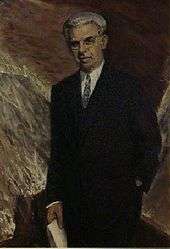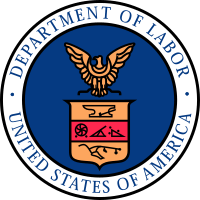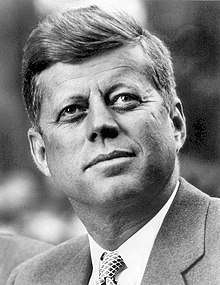Arthur Goldberg
Arthur Joseph Goldberg (August 8, 1908 – January 19, 1990) was an American statesman and jurist who served as the 9th U.S. Secretary of Labor, an Associate Justice of the Supreme Court of the United States, and the 6th United States Ambassador to the United Nations.
Arthur Goldberg | |
|---|---|
.jpg) | |
| 6th United States Ambassador to the United Nations | |
| In office July 28, 1965 – June 24, 1968 | |
| President | Lyndon B. Johnson |
| Preceded by | Adlai Stevenson II |
| Succeeded by | George Ball |
| Associate Justice of the Supreme Court of the United States | |
| In office September 28, 1962 – July 26, 1965 | |
| Nominated by | John F. Kennedy |
| Preceded by | Felix Frankfurter |
| Succeeded by | Abe Fortas |
| 9th United States Secretary of Labor | |
| In office January 21, 1961 – September 20, 1962 | |
| President | John F. Kennedy |
| Preceded by | James Mitchell |
| Succeeded by | Willard Wirtz |
| Personal details | |
| Born | Arthur Joseph Goldberg August 8, 1908 Chicago, Illinois, U.S. |
| Died | January 19, 1990 (aged 81) Washington, D.C., U.S. |
| Political party | Democratic |
| Spouse(s) | Dorothy Kurgans
( m. 1931; died 1988) |
| Children | 2 |
| Education | Crane College DePaul University Northwestern University (JD) |
Born in Chicago, Illinois, Goldberg graduated from the Northwestern University School of Law in 1930. He became a prominent labor attorney and helped arrange the merger of the American Federation of Labor and the Congress of Industrial Organizations. During World War II, he served in the Office of Strategic Services, organizing European resistance to Nazi Germany. In 1961, President John F. Kennedy appointed Goldberg as the Secretary of Labor.
In 1962, Kennedy successfully nominated Goldberg to the Supreme Court to fill a vacancy created by the retirement of Felix Frankfurter. Goldberg aligned with the liberal bloc of justices and wrote the majority opinion in Escobedo v. Illinois. In 1965, Goldberg resigned from the bench to accept appointment by President Lyndon B. Johnson as the Ambassador to the United Nations. In that role, he helped draft UN Resolution 242 in the aftermath of the Six-Day War. He ran for the position of Governor of New York in 1970 but was defeated by Nelson Rockefeller. After his defeat, he served as president of the American Jewish Committee and continued to practice law.
Early life
Goldberg was born and raised on the West Side of Chicago, the youngest of eight children of Rebecca Perlstein and Joseph Goldberg, Jewish immigrants from the Russian Empire. His paternal line derived from a shtetl called Zenkhov, in Ukraine. Goldberg's father, a produce peddler, died in 1916, forcing Goldberg's siblings to quit school and go to work to support the family. As the youngest child, Goldberg was allowed to continue school, graduating from Harrison Technical High School[1] at the age of 16. Thereafter, Goldberg worked his way through Crane Junior College of the City Colleges of Chicago and DePaul University before earning B.S.L. (magna cum laude; 1929) and J.D. (1930) degrees from Northwestern University.[2]
Goldberg's interest in the law was sparked by the noted murder trial in 1924 of Leopold and Loeb, two wealthy young Chicagoans who were spared the death penalty with the help of their high-powered defense attorney, Clarence Darrow. Goldberg later pointed to the case as inspiration for his opposition to the death penalty on the bench, since he had seen how inequality of social status could lead to unfair application of the death penalty.
In 1931, Goldberg married Dorothy Kargans. They had one daughter, Barbara Goldberg Cramer, and one son, Robert M. Goldberg (an attorney in Anchorage, Alaska).[3] He was the uncle of Barry Goldberg.[4]
World War II
During World War II, Goldberg was a member of the United States Army, wherein he served as a captain and later a major. He served as well in an espionage group operated by the Office of Strategic Services, the precursor to the CIA,[5] serving as chief of the Labor Desk, an autonomous division of the American intelligence agency that was charged with the task of cultivating contacts and networks within the European underground labor movement during World War II. The Jewish Telegraphic Agency stated, "Goldberg's file notes that as both a civilian and a member of the Army, he supervised a section in the Secret Intelligence Branch of OSS to maintain contact with labor groups and organizations regarded as potential resistance elements in enemy-occupied and enemy countries. He organized anti-Nazi European transportation workers into an extensive intelligence network."[6]
Labor lawyer
Goldberg became a prominent labor lawyer, representing striking Chicago newspaper workers on behalf of the Congress of Industrial Organizations (CIO) in 1938. Appointed general counsel to the CIO in 1948 to succeed Lee Pressman,[7] Goldberg served as a negotiator and chief legal adviser in the merger of the American Federation of Labor and CIO in 1955. Goldberg also served as general counsel of the United Steelworkers of America.
Kennedy administration
Goldberg was by this time a prominent figure in the Democratic Party and in labor union politics. President John F. Kennedy appointed Goldberg to two positions. The first was United States Secretary of Labor, where he served from 1961 to 1962. As secretary, he served as a mentor to the young Daniel Patrick Moynihan. The second was as an associate justice of the Supreme Court of the United States, replacing Felix Frankfurter, who had retired because of poor health.
From 1961-1962, Goldberg was also a member of the Council on Foreign Relations.
As of 2019, Goldberg is the last Supreme Court justice to have served in the United States Cabinet.

Supreme Court
Goldberg was confirmed unanimously by the Senate on August 31, 1962. [8]
Despite his short time on the bench, Goldberg played a significant role in the Court's jurisprudence, as his liberal views on Constitutional questions shifted the Court's balance toward a broader construction of constitutional rights. His best-known opinion came in the concurrence of Griswold v. Connecticut (1965), arguing that the Ninth Amendment supported the existence of an unenumerated right of privacy. He argued that to determine if a right is a fundamental right, the court should look to whether the right involved is of such a character that it cannot be denied without violating those fundamental principles of liberty and justice which lie at the base of all America's civil and political institutions.[9]
Perhaps Goldberg's most influential move on the Court involved the death penalty. Goldberg argued in a 1963 internal Supreme Court memorandum that imposition of the death penalty was condemned by the international community and should be regarded as "cruel and unusual punishment," in contravention of the Eighth Amendment. Finding support in this position from two other justices (William J. Brennan and William O. Douglas), Goldberg published an opinion dissenting from the Court's denial of certiorari in a case, Rudolph v. Alabama, involving the imposition of the death penalty for rape, in which Goldberg cited the fact that only five nations responding to a UN survey indicated that they allowed imposition of the death penalty for rape, including the U.S., and that 33 states in the U.S. had outlawed the practice.
Goldberg's dissent sent a signal to lawyers across the nation to challenge the constitutionality of capital punishment in appeals. As a result of the influx of appeals, the death penalty effectively ceased to exist in the United States for the remainder of the 1960s and 1970s, and the Supreme Court considered the issue in the 1972 case of Furman v. Georgia, where the Justices, in a 5 to 4 decision, effectively suspended the death penalty laws of states across the country on the ground of the capricious imposition of the penalty. That decision would be revisited in 1976's Gregg v. Georgia, where the justices voted to allow the death penalty under some circumstances; the death penalty for rape of an adult female victim, however, would be struck down in 1977's Coker v. Georgia. In 2008 the death penalty for rape of children was ruled unconstitutional by a 5 to 4 decision (Kennedy v. Louisiana).
During his tenure on the Supreme Court, one of his law clerks was future associate justice Stephen Breyer, who holds the exact seat Goldberg once occupied. Another was prominent criminal law professor Alan Dershowitz. Goldberg resigned from the Supreme Court to become the U.S. ambassador to the U.N, in what has been described as a calculated move by Lyndon Johnson in order for Johnson to appoint his longtime friend Abe Fortas to Goldberg's seat (which some at that time called the "Jewish seat" on the Court).[10][11]
UN Ambassador

In 1965, Goldberg was persuaded by Johnson to resign his seat on the court to replace the recently deceased Adlai Stevenson II as the Ambassador to the United Nations. Johnson wanted to appoint his friend, Abe Fortas, to the court.[11] If any of his Great Society reforms were going to be deemed unconstitutional by the Court, he thought that Fortas would notify him in advance.[12] Goldberg had declined an earlier offer to leave his position to be Secretary of Health, Education and Welfare.[12] He took Johnson's offer of the UN ambassadorship when Johnson discussed it with him on Air Force One to Illinois for the burial of Stevenson, however.[12]
Goldberg wrote in his memoirs that he resigned to have influence in keeping the peace in Vietnam and that after the crisis had passed, he expected he would be reappointed to the Supreme Court by Johnson. He also said, "I had an exaggerated opinion of my capacities. I thought I could persuade Johnson that we were fighting the wrong war in the wrong place [and] to get out."[13]:348–351
David Stebenne, Goldberg's biographer, adds, "Many observers, then and later, found this answer hard to accept." He suggests, "Johnson must have had some influence over Goldberg that induced him [to resign from the Supreme Court]." Time reported in 1962 that Johnson knew that for a party thrown in Johnson's honor that year, a Goldberg aide, Jerry Holleman, solicited contributions from wealthy supporters of Johnson, including Billy Sol Estes. Holleman accepted responsibility and there was no public awareness of Goldberg and Johnson's involvement.[14]
Johnson said of the Goldberg decision in his later-released audio tapes:
Goldberg would be able to answer the Russians... very effectively... He's got a bulldog face on him, and I think this Jew thing would take The New York Times-- all this crowd that gives me hell all the time-- and disarm them. And still have a Johnson man. I've always thought that Goldberg was the ablest man in Kennedy's Cabinet, and he was the best man to us.... Goldberg sold bananas, you know.... He's kind of like I am... He's shined some shoes in his day and he's sold newspapers, and he's had to slug it out...[12]
Resolution 242
In 1967, Goldberg was a key drafter of Resolution 242, which followed the 1967 Six-Day War between Israel and the Arab states. While interpretation of that resolution has subsequently become controversial, Goldberg was very clear that the resolution does not obligate Israel to withdraw from all of the captured territories. He stated that:
The notable omissions in language used to refer to withdrawal are the words the, all, and the June 5, 1967, lines. I refer to the English text of the resolution. The French and Soviet texts differ from the English in this respect, but the English text was voted on by the Security Council, and thus it is determinative. In other words, there is lacking a declaration requiring Israel to withdraw from the (or all the) territories occupied by it on and after June 5, 1967. Instead, the resolution stipulates withdrawal from occupied territories without defining the extent of withdrawal. And it can be inferred from the incorporation of the words secure and recognized boundaries that the territorial adjustments to be made by the parties in their peace settlements could encompass less than a complete withdrawal of Israeli forces from occupied territories [italics by Goldberg].[15]
Goldberg's role as the UN ambassador during the Six-Day War may have been the reason why Sirhan Sirhan, the assassin of Robert F. Kennedy, also wanted to assassinate Goldberg.[16]
Subsequent career
.jpg)
Frustrated with the war in Vietnam, Goldberg resigned from the ambassadorship in 1968 and accepted a senior partnership with the New York law firm Paul, Weiss, Rifkind, Wharton & Garrison. Longing to return to the bench, Goldberg later claimed that he was Earl Warren's preference to succeed him when the chief justice announced his retirement in 1968, but President Johnson selected Abe Fortas instead.[17] After Fortas's nomination was withdrawn in the face of Senate opposition, Johnson briefly considered naming Goldberg chief justice as a recess appointment before ruling out the idea.[13]:373 On 15 October 1969, Goldberg was a featured speaker at the Moratorium to End the War in Vietnam march.[18]
With the prospect of a return to the Supreme Court closed to him by the election of Richard Nixon, Goldberg contemplated a run for elected office. Initially considering a challenge to Charles Goodell's reelection to the United States Senate, he decided to run against New York Governor Nelson Rockefeller in 1970. Though the former justice initially polled well, a contested primary and Goldberg's own poor skills as a campaigner, coupled with Rockefeller's formidable advantages, resulted in a 700,000 vote margin of victory for the incumbent Republican.[13]:375–8
After his defeat, Goldberg returned to law practice in Washington, D.C., and served as President of the American Jewish Committee.[19] In 1972, Goldberg returned to the Supreme Court as a lawyer, representing Curt Flood in Flood v. Kuhn. His oral argument was referred to by one observer as "one of the worst arguments I'd ever heard – by one of the smartest men I've ever known..."[20] Under President Jimmy Carter, Goldberg served as United States Ambassador to the Belgrade Conference on Human Rights in 1977, and was awarded the Presidential Medal of Freedom in 1978.
Once again Goldberg was a member of the Council on Foreign Relations from 1966 until 1989.
Goldberg died in 1990. As a former member of the U.S. Army he was buried at Arlington National Cemetery in Virginia.[21]
See also
- Demographics of the Supreme Court of the United States
- John F. Kennedy Supreme Court candidates
- List of Justices of the Supreme Court of the United States
- List of law clerks of the Supreme Court of the United States
- List of United States Supreme Court Justices by time in office
- United States Supreme Court cases during the Warren Court
References
- "Chicago Carter Harrison Technical High School". Illinois HS Glory Days. Retrieved June 24, 2018.
- "Arthur J. Goldberg Papers (Library of Congress)".
- Shannon, Don; Pogatchnik, Shawn (January 20, 1990). "Ex-U.S. Justice and U.N. Envoy Goldberg Dies". Los Angeles Times.
- Benarde, S.R. (2003). Stars of David: Rock'n'roll's Jewish Stories. Brandeis University Press, published by University Press of New England. p. 104. ISBN 9781584653035. Retrieved October 15, 2014.
- Edward B. Shils, "Arthur Goldberg: Proof of the American Dream" Monthly Labor Review, January 1997
- "JTA - Jewish & Israel News | Jewish Telegraphic Agency". jta.org. Archived from the original on August 19, 2008. Retrieved October 15, 2014.
- "CIO Names General Counsel". New York Times. March 5, 1948. p. 7. Retrieved March 18, 2017.
- "U.S. Senate: Supreme Court Nominations (Present-1789)".
- Griswold v. Conn. 381 U.S. 479 (U.S. 1965)
- James Taranto, Leonard Leo (2004). Presidential Leadership. Wall Street Journal Books. ISBN 978-0-7432-7226-1. Retrieved October 20, 2008.
- David A. Kaplan (September 4, 1989). "The Reagan Court – Child of Lyndon Johnson?". The New York Times. Retrieved October 20, 2008.
- Michael Beschloss (2001). Reaching for Glory. Simon & Schuster. ISBN 978-0-7432-2714-8. Retrieved October 20, 2008.
- Stebenne, David L. (1996). Arthur J. Goldberg, New Deal Liberal. New York: Oxford University Press. ISBN 0-19-507105-0.
- Editors of Time (May 18, 1962). "Tauter & Tauter". Time. Retrieved May 28, 2008.
Just two days before Holleman confirmed that he had asked Estes and other Texans to pick up the tab for a January dinner Labor Secretary Arthur Goldberg gave for Lyndon Johnson, but said he backed off when he learned that Goldberg's policy was to pay for all such dinners himself. Goldberg promptly offered to produce canceled checks to prove he had paid for the dinner. Said Holleman of Billie Sol, in words reminiscent of a previous Democratic Administration: "I have not and I never will deny him as a friend."
CS1 maint: extra text: authors list (link) - "UN Security Council Resolutions 242 and 338".
- Issenberg, Sasha (June 5, 2008). "Slaying gave US a first taste of Mideast terror". The Boston Globe. Retrieved December 3, 2019.
- Bernard Schwartz, Super Chief: Earl Warren and his Supreme Court (New York: New York University Press, 1983), p. 720.
- Karnow 1983, p. 599.
- Jewish Virtual Library, Arthur Goldberg.
- Along with Goldberg, Abe Fortas was the only other Warren era justice to later argue a case before that body. Dan Levitt, quoted in Brad Snyder, Curt Flood's Fight for Free Agency in Professional Sports, p. 281
- "Archived copy". Archived from the original on May 10, 2009. Retrieved 2009-05-29.CS1 maint: archived copy as title (link)
Further reading
- Abraham, Henry J. (1992). Justices and Presidents: A Political History of Appointments to the Supreme Court (3rd ed.). New York: Oxford University Press. ISBN 0-19-506557-3.
- Cushman, Clare (2001). The Supreme Court Justices: Illustrated Biographies, 1789–1995 (2nd ed.). (Supreme Court Historical Society, Congressional Quarterly Books). ISBN 1-56802-126-7.
- Frank, John P. (1995). Friedman, Leon; Israel, Fred L. (eds.). The Justices of the United States Supreme Court: Their Lives and Major Opinions. Chelsea House Publishers. ISBN 0-7910-1377-4.
- Goldberg, Arthur J. AFL-CIO: Labor United. New York: McGraw-Hill, 1956.
- Goldberg, Arthur J. Equal Justice: The Supreme Court in the Warren Era. Chicago: Northwestern University Press, 1971. ISBN 0 14 00 7324 8
- Goldberg, Arthur J. The Defenses of Freedom: The Public Papers of Arthur J. Goldberg. Daniel Patrick Moynihan, ed. 1st ed. New York: Harper & Row, 1966.
- Hall, Kermit L., ed. (1992). The Oxford Companion to the Supreme Court of the United States. New York: Oxford University Press. ISBN 0-19-505835-6.
- Martin, Fenton S.; Goehlert, Robert U. (1990). The U.S. Supreme Court: A Bibliography. Washington, D.C.: Congressional Quarterly Books. ISBN 0-87187-554-3.
- Karnow, Stanely (1983). Vietnam: A History. London: Penguin Books. ISBN 0-19-507105-0.
- Stebenne, David (1996). Arthur J. Goldberg: New Deal Liberal. New York: Oxford University Press. ISBN 0-19-507105-0.
- Urofsky, Melvin I. (1994). The Supreme Court Justices: A Biographical Dictionary. New York: Garland Publishing. p. 590. ISBN 0-8153-1176-1.
External links
| Wikisource has original works written by or about: Arthur Goldberg |
- JFK to Secretary of Labor, Arthur Goldberg: Missile and Space Programs - End Labor Delays, 1961 Shapell Manuscript Foundation
- Biography. U.S. Department of Labor. No date. at the Wayback Machine (archived 2006-05-09)
- Oyez, U.S. Supreme Court media, Arthur J. Goldberg.
- Oral History Interview with Arthur Goldberg, from the Lyndon Baines Johnson Library at the Library of Congress Web Archives (archived 2001-11-16)
- Appearances on C-SPAN
- Arthur Goldberg's FBI files, hosted at the Internet Archive:
| Party political offices | ||
|---|---|---|
| Preceded by Frank O'Connor |
Democratic nominee for Governor of New York 1970 |
Succeeded by Hugh Carey |
| Preceded by Franklin Delano Roosevelt Jr. |
Liberal nominee for Governor of New York 1970 |
Succeeded by Hugh Carey |
| Legal offices | ||
| Preceded by Felix Frankfurter |
Associate Justice of the Supreme Court of the United States 1962–1965 |
Succeeded by Abe Fortas |
| Political offices | ||
| Preceded by James Mitchell |
United States Secretary of Labor 1961–1962 |
Succeeded by Willard Wirtz |
| Diplomatic posts | ||
| Preceded by Adlai Stevenson II |
United States Ambassador to the United Nations 1965–1968 |
Succeeded by George Ball |




